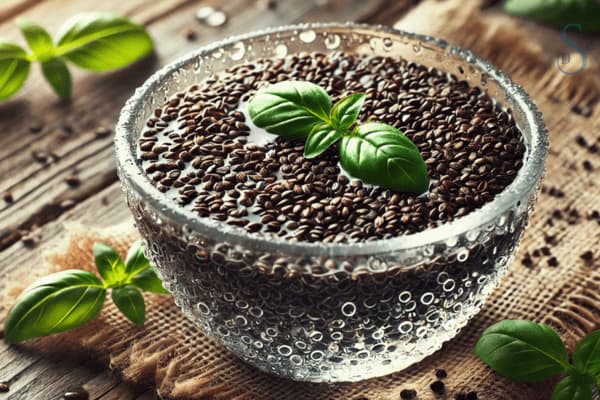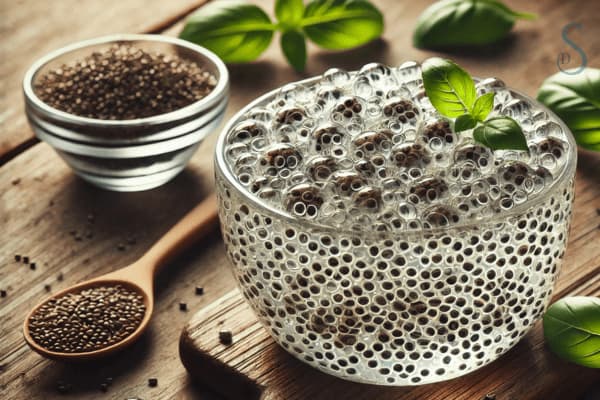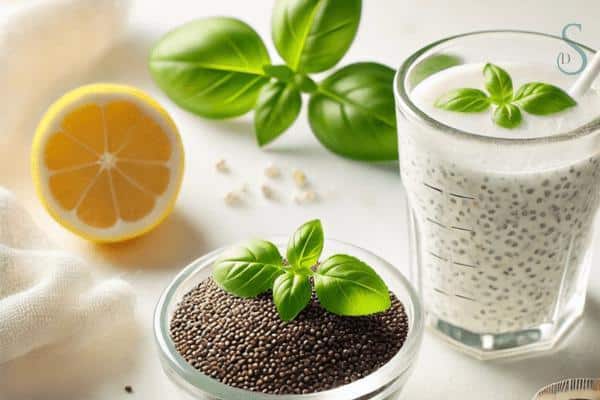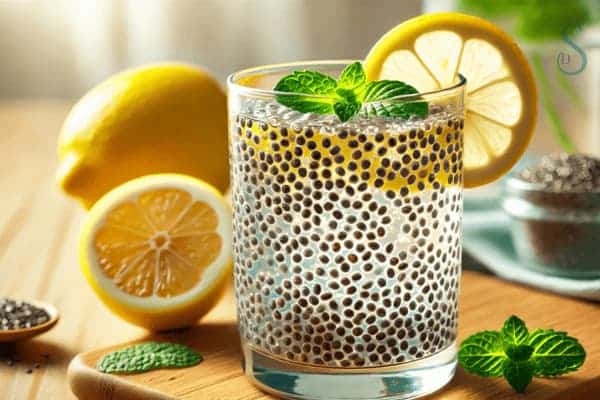Benefits of Sabja Seeds: This article provides a complete guide on sabja seeds, including their nutrients, health benefits, how to eat them, and FAQs.
Table of Contents
What is meant by sabja seeds?

Sabja seeds are generally called basil seeds. These seeds come from the basil plant, which is well known in India. Most Indian women use this plant for puja (worship).
Basil leaves have many medicinal benefits and are commonly used as a home remedy for coughs and colds. Sabja seeds are found at the top of dried basil flowers. When basil plant flowers dry up, rubbing the flowers releases the seeds. Basil leaves have a unique aroma and flavor. They are used to add a special taste to dishes. Besides enhancing flavor, they also have medicinal properties.
How to Identify Sabja Seeds?
- Color & Shape: Small, round, and black.
- Texture: Hard when dry; forms a jelly-like layer when soaked in water.
- Water Absorption: Swells instantly when soaked.
- Taste: Mild, almost tasteless.
List of Sabja Seeds’ common names in different languages

| Language | Common Name |
|---|---|
| English | Sabja Seeds, Basil Seeds, Tukmaria Seeds, Sweet Basil Seeds |
| Telugu | Sabja Ginjalu, Kamakasturi Vittanalu |
| Hindi | Sabja Beej, Tukmaria |
| Tamil | Thiruneetru Pachai Vithai |
| Kannada | Kamakasturi Beeja |
| Malayalam | Kamakasturi Vithu |
| Marathi | Sabja Biya, Tukmaria |
| Gujarati | Tukmaria Beej |
| Bengali | Sabja Beej |
| Punjabi | Tukmaria Beej |
| Urdu | Tukh Malanga |
| Sanskrit | Trana Beej |
Sabja Seeds Nutrients
Here’s a table showing the nutritional composition of Sabja Seeds (Basil Seeds) per 100 grams:
| Nutrient | Amount per 100g |
|---|---|
| Calories | 480 kcal |
| Carbohydrates | 42 g |
| Protein | 14 – 20 g |
| Fats | 25 – 30 g |
| Dietary Fiber | 30 – 40 g |
| Omega-3 Fatty Acids | 4 – 5 g |
| Omega-6 Fatty Acids | 8 – 10 g |
| Calcium | 200 – 250 mg |
| Magnesium | 300 – 400 mg |
| Iron | 10 – 12 mg |
| Potassium | 600 – 700 mg |
| Phosphorus | 400 – 500 mg |
| Zinc | 3 – 5 mg |
| Vitamin A | 500 – 600 IU |
| Vitamin K | 60 – 70 mcg |
Top 4 Benefits of Sabja Seeds
Strengthen Your Bones Naturally with Sabja Seeds

In recent days, young people are experiencing more fractures for minor reasons. For older adults, weak bones and fractures are common, but for young individuals, this is concerning. The main reason behind this is calcium deficiency.
Children below 20 years of age require approximately 600 mg of calcium daily, while those above 20 years need around 450 mg. Without vitamin D, the calcium present in food cannot be properly absorbed by the body.
Sabja seeds contain six times more calcium than milk. One spoon of sabja seeds provides 115 mg of calcium. These seeds absorb 7 to 8 times their weight in water. Consuming one to two spoons of sabja seeds per day provides sufficient calcium, helping to strengthen bones.
Additionally, sabja seeds contain 50 mg of magnesium, which also contributes to bone health.
Sabja Seeds for Weight Loss
Sabja seeds can be a helpful addition to your weight loss journey. When soaked in water, they expand and create a gel-like texture, which helps you feel fuller for longer. This feeling of fullness can curb unnecessary cravings and reduce the temptation to snack on high-calorie foods. By cutting down on excess calorie intake, sabja seeds support your efforts to shed extra weight. They’re also packed with dietary fiber, which not only aids digestion but also keeps you satisfied, making it easier to stick to a healthy eating plan.
For the best results, try drinking sabja seed water first thing in the morning on an empty stomach. This simple habit can kickstart your metabolism and set a positive tone for the rest of the day.
Sabja Seeds for Cooling the Body
Feeling overheated? Sabja seeds might be the natural remedy you need. When your body doesn’t get enough water, it can lead to dehydration, which often causes an increase in body heat. This can result in discomfort, such as a burning sensation during urination or general unease. Sabja seeds have a unique ability to absorb and hold water, which helps keep your body hydrated when consumed.
By drinking sabja seed water regularly, you can help cool your body down and alleviate heat-related issues. It’s a simple, natural way to maintain proper hydration levels and keep your body feeling balanced and refreshed.
Sabja seeds for skin and hair

- Sabja seeds are very rich in antioxidants. So, they protect your skin from damage.
- They help keep your skin hydrated, giving it a natural glow.
- The seeds can soothe irritated skin and reduce redness or inflammation.
- Sabja seeds contain essential nutrients that promote healthy hair growth
- They strengthen hair roots, reducing breakage and split ends.
- Applying Sabja seed gel can condition your hair, making it softer and smoother.
- The seeds help fight dandruff by maintaining a healthy scalp.
- Their cooling properties can calm an itchy or dry scalp.
- Sabja seeds improve blood circulation, which benefits both skin and hair.
How to Use Sabja seeds?
Before using sabja seeds in any dishes, we should soak them for 10 to 15 mins. After that, only we have to use them.
Sabja Lemon Detox Water Recipe

Ingredients:
- 1 teaspoon sabja seeds
- 1 glass (250 ml) of water
- 1 teaspoon lemon juice
- 1 teaspoon honey (optional)
Instructions:
- Soak 1 teaspoon of sabja seeds in a glass of water for 10-15 minutes.
- Then they expand by absorbing water.
- Then, add 3 to 4 drops of lemon juice to the water.
- Mix well.
- Then mix in 1 teaspoon of honey.
- Drink and enjoy.
Who should avoid sabja seeds?
- Do not eat dry seeds.
- Do not consume more than 2 to 3 spoons per day.
- Pregnant women should not eat them.
- Do not give them to children.
- People taking blood-thinning medications should avoid them.
Frequently asked questions
1. Which is better sabja seeds or chia seeds for weight loss ?
A. Both seeds are good for weight loss. But sabja seeds absorb water faster than chia seeds. So making you feel full quickly. Chia seeds provide required energy and omega-3s. They are good for our metabolism.
2. Which has more nutrients, sabja seeds or pumpkin seeds?
A. Pumpkin seeds have more protein, magnesium, and healthy fats, benefiting heart and brain health compared to sabja. While sabja seeds are higher in fiber and antioxidants. They support mainly digestion and weight loss.
3. Can children consume sabja seeds?
A. Yes, sabja seeds are safe for children above 3 years only. But always give them in moderation and soaked in water.

